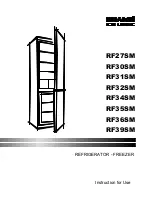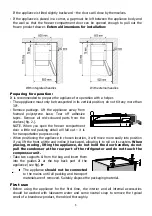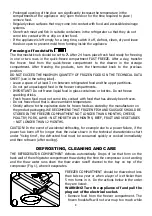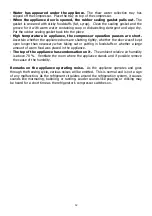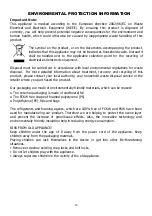
4
–
Do not climb on or sit on the appliance, do not lean on or hang on the appliance
doors and do not allow children to do this.
–
Do not remove or touch items from the freezer compartment if your hands are wet
or damp.
–
Do not use water spray and steam to clean the appliance.
The appliance should be transported in the vertical position; do not
tilt any more than 30°. The manufacturer will not be responsible for any
damage of the appliance that results from non-compliance with the
instructions for transportation.
The manufacturer guarantees reliable operation of the refrigerator when
the relative air humidity not greater than 70 per cent and the ambient
temperature is:
+16 TO +32 DEGREES CELSIUS (Climate class N);
+16 TO +38 DEGREES CELSIUS (Climate class ST);
+16 TO +43 DEGREES CELSIUS (Climate class T).
INSTALLATION AND OPERATING CONDITIONS
Positioning:
•
This appliance can be installed in a dry, well ventilated indoor where the ambient
temperature corresponds to the climate class indicated on the rating plate of the
appliance.
Do not install this appliance in areas that are too humid or too colds, such as the
construction appendices, garages or wine cellars. Place the appliance away from
heat sources such as kitchen stove/oven, radiators, or direct sunlight. The appliance
must not touch any pipes for heating, gas or water supply, or any other electrical
devices.
Minimum distances from the heat sources:
- from the electric gas and other ovens - 30 mm,
- from oil or coal fired ovens - 300 mm,
- from built-in ovens - 50 mm
If there is no possibility of ensuring the above- mentioned distances,
provide an appropriate insulation board.
•
Do not cover the ventilation holes at the top of the appliances – it
must be a good air circulation around the appliance. There should
be a gap of at least 10 cm between the top of the appliance body
and any furniture that may be above it. If this requirement is not
followed, the appliance consumes more electrical energy and its
compressor may overheat.
•
The appliance must stand on a level surface and must not touch the
wall. If necessary, regulate the height of the appliance by adjusting
the levelling feet: by turning them clockwise – the front of the
appliance rises, by turning them counter clockwise – it comes down.

